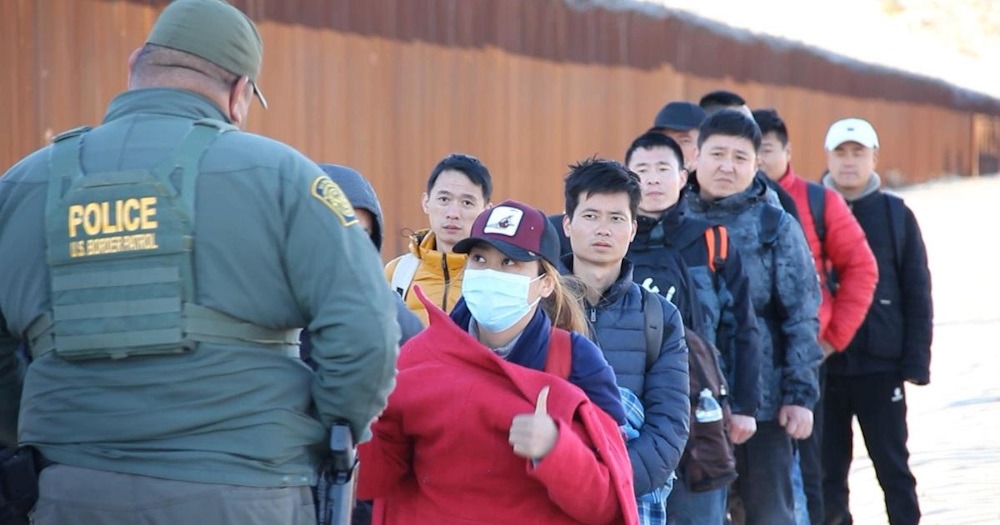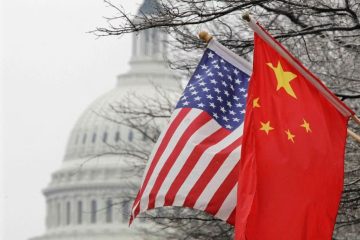How Chinese migrants become part of the U.S. economy

Chinese migrants utilize their vast networks to become part of the U.S. economy. After a monthlong journey that started in China’s southeastern seaboard and involved an unfortunate encounter with fire ants in Latin America, Audi Lin successfully entered the U.S. from Mexico, was released from detention, and eventually arrived in New York.
Lin was picked up by a distant relative from his home province of Fujian at LaGuardia Airport and taken directly to Flushing’s Chinatown, which is known for having a significant Chinese population in the U.S. During their conversation, the relative informed Lin about various Chinese websites and apps that provide job listings and details about accommodations suitable for Chinese migrants. Many individuals, such as Lin, seek asylum by voluntarily surrendering to U.S. agents at the border. They are then granted permission to remain in the U.S. while their immigration cases are being reviewed by judges.
After Lin’s relative dropped him off, he had a clear idea of his accommodation for the night. In just one month, he secured a position as a busser at a takeout restaurant owned by Fujianese individuals in Harlem. “Chinese individuals typically do not find themselves in homeless shelters,” stated Lin.
There are striking similarities between the experiences of migrants from China and those from South and Central American countries who make long and difficult journeys to reach the southern U.S. border. However, once they reach U.S. soil, their journeys start to take different directions.
Chinese migrants have an advantage when it comes to finding jobs and housing compared to arrivals from Latin America. This is because they have access to a wide network of friends and relatives who have also migrated to the U.S. in the past. The journey is certainly challenging: New migrants are at risk of being taken advantage of. Finding well-compensated employment can be challenging, often requiring individuals to put in extensive hours. However, some employers do offer additional perks such as meals and housing.
The strength of the U.S. economy, characterized by wage growth and ongoing business expansion, has enabled certain migrants to begin anew in the country, despite the increasing number of migrants. According to the U.S. Bureau of Labor Statistics, the count of working immigrants, regardless of their legal status, has remained above 30 million since February.
According to data from U.S. Customs and Border Protection, there has been a consistent number of 1.7 million migrants apprehended at the country’s border with Mexico in each of the past three fiscal years. A significant number of individuals have migrated from Latin America, particularly from Venezuela, with the influx of Venezuelan migrants exceeding 200,000 in each of the previous two years.
The number of people using that route from China has also increased. In the government’s fiscal year starting last October through June, authorities apprehended 33,508 Chinese migrants at the southern border, which is an increase from the previous fiscal year’s total of 24,314. In the previous fiscal year, there were 2,176 apprehensions.
Individuals like Lin, who intend to seek asylum based on religious reasons, are eligible to apply for a work permit once their asylum application has been under review for six months. They are not allowed to work until then, but many come with limited savings and it is typical for them to begin working for cash shortly after.
Migrants frequently gravitate towards Chinese enclaves in New York and California, establishing connections with Chinese business establishments throughout the country. They spread out to Chinese restaurants and private homes as caretakers; some have even found work at Chinese-operated marijuana farms that have emerged in states where cannabis has been legalized.
Flushing, a vast neighborhood in Queens that boasts the largest Chinatown in New York City, has always been a popular destination for immigrants.
“New immigrants are aware that if they choose to settle in areas such as Flushing, Queens, they will find signage that is familiar to them and a ready-made community network,” explains Mitchel Wu, the Queens borough director for the Chinese-American Planning Council, a social service agency.
According to a Customs and Border Protection official, Chinese migrants typically arrive in the U.S. with a well-thought-out plan, having invested over $10,000 in their journeys. This is in contrast to many migrants from central America, who tend to spend much less. As part of an initiative to reduce the influx of Chinese migrants entering the U.S. via the southern border, the government has recently conducted a significant deportation operation. This operation involved the repatriation of 116 Chinese nationals back to China, marking a notable return by charter flight after a considerable period of time.
In Chinese enclaves like Flushing, there has been a rise in the establishment of new services aimed at helping the recent arrivals adapt to their new surroundings. At the Queens Public Library, small, family-owned hotels proudly display their affordable rates starting at $290 per month, along with convenient communal cooking facilities.
A number of Chinese job-placement agencies have transitioned their services to the online platform. However, at Red Apple Employment Agency, Chinese migrants have the opportunity to seek guidance from the owner, Jenny Geng, who personally immigrated to the U.S. over twenty years ago.
One sign in Chinese on her wall states, “Those without proper status welcome,” although Geng suggests that individuals obtain work permits to facilitate their job search. Her fees for job placements range from $80 to $100. In addition to that, we also provide support for applying for health insurance and obtaining truck-driving licenses.
According to CPC’s Wu, gateway communities such as Flushing may not provide migrants with the necessary support for long-term employment or career advancement. According to him, newcomers are often forced into a lower-tier working class, making it challenging to move up in society.
Certain migrant women, lacking viable alternatives, have unfortunately been coerced into engaging in sex work. Businesses in the vicinity of 40th Road in Flushing have observed a notable rise in the presence of Chinese women soliciting pedestrians, as reported.
Chinese migrants continue to be drawn to the U.S. as they perceive a more promising economic outlook compared to their home country, which they left behind due to economic struggles or political suppression by the Chinese Communist Party.
Jobin Cai, 33, arrived in the U.S. via the southern border and initially settled in Brooklyn’s Sunset Park, a vibrant Chinese neighborhood, where he temporarily resided with a cousin. He spent $500 to intern for two weeks at a Chinese nail salon, followed by another $500 to learn from a sushi chef at a restaurant in Connecticut.
After unsuccessful attempts at finding employment through training, he was fortunate enough to be introduced to a Chinese-run auto factory in Michigan that had job openings, thanks to a friend from China. Cai quickly realized that the pay of $15 an hour was more attractive than what he could earn at a restaurant job, so he wasted no time in flying out, even though he didn’t have a work permit. After six months of work, he has come to the conclusion that life in the U.S. is comparatively easier than in China, where his restaurant business suffered greatly during the pandemic.
“There is a language barrier, but in this situation, you have the opportunity to earn a higher income and increase your savings,” he stated.
According to Lin, working at the Harlem restaurant played a crucial role in his successful transition to life in the United States. He is aspiring to secure a more lucrative job and envisioning the possibilities of eventually launching his own business.
These days, his income is derived from brokering a few property sale transactions in mainland China, all conducted through the Chinese messaging app WeChat. In addition, he assists Chinese friends and acquaintances in transferring small amounts of money to one another.
Lin is very frugal when it comes to meals and cigarettes. He owes a total of $20,000 for the expenses of his journey to the U.S., and an immigration lawyer he hired is demanding an additional $12,000. “I haven’t even paid one-tenth,” he remarked. “However, I arrived in the United States with the intention of exploring new opportunities.”










